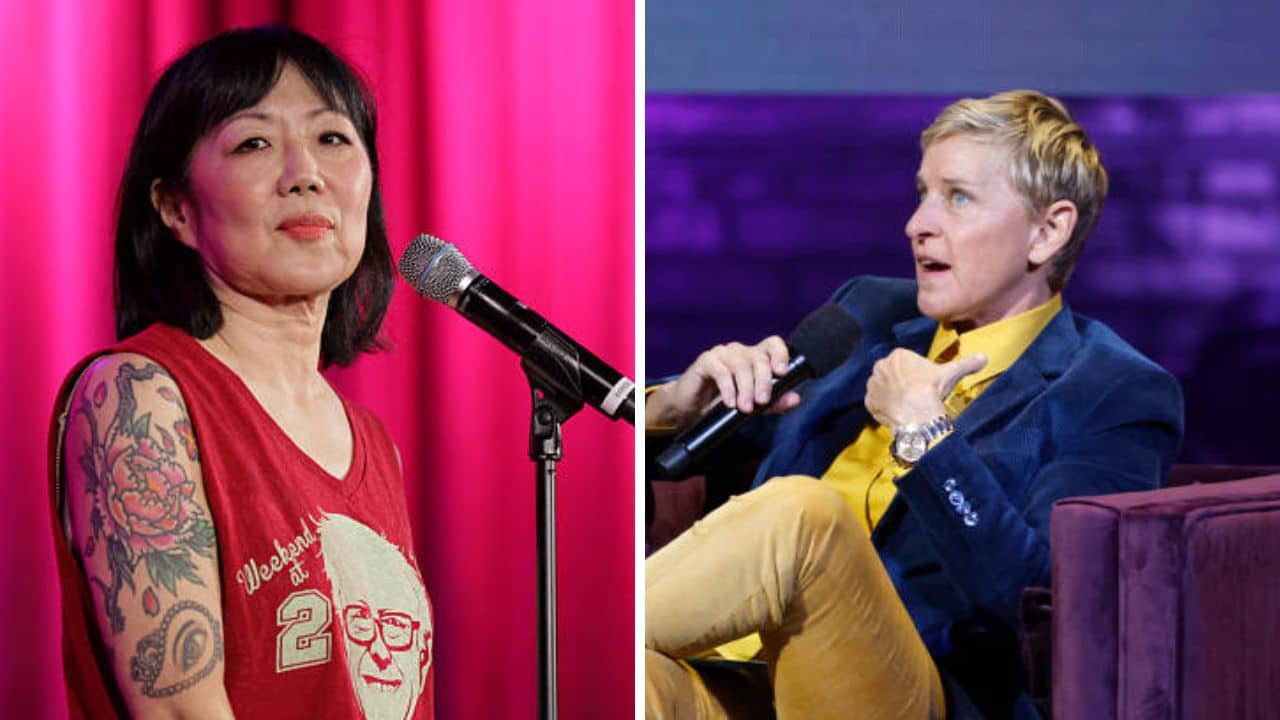Margaret Cho, the trailblazing comedian known for her fearless honesty and groundbreaking work in comedy and advocacy, recently opened up about an uncomfortable and perplexing experience with television icon Ellen DeGeneres. In a podcast interview that has since sparked considerable online buzz, Cho shared how an encounter with the former daytime talk show host left her feeling uneasy and alienated.
This revelation adds yet another layer to the evolving public perception of DeGeneres, who in recent years has faced criticism for alleged behind-the-scenes behavior that contradicts her long-standing “be kind” image.
A Meeting That Left a Mark

Margaret Cho’s recollection took place during an appearance on a popular podcast. While reminiscing about her long career in comedy, Cho mentioned an encounter with Ellen DeGeneres that stood out—not because it was warm or uplifting, but because it was, in her words, “really weird” and “not nice.”
Cho described how she felt brushed off and dismissed during the meeting, a far cry from the warmth she had hoped to receive from a fellow trailblazer in the entertainment industry. What struck her most was the coldness and lack of acknowledgment, despite the shared experience of breaking barriers as LGBTQ+ performers.
More Than Just a Personal Experience

What makes Cho’s story resonate is that it isn’t just about one awkward exchange. It ties into a broader narrative that’s been unfolding around Ellen DeGeneres in recent years. Numerous reports and testimonials have emerged, suggesting a pattern of difficult behavior behind the scenes of her long-running daytime talk show.
Employees, guests, and collaborators have spoken out about their experiences, with some describing a toxic workplace culture that seemed at odds with the show’s cheerful and compassionate public image.
Cho’s story serves as a poignant reminder that fame and image don’t always align with personal interactions—and that even seasoned performers can find themselves on the receiving end of unexpected coldness.
Why It Matters: Representation and Respect in Hollywood

Margaret Cho’s story is also significant for another reason—it touches on the challenges faced by LGBTQ+ entertainers in Hollywood. Cho, who has spent decades breaking down barriers for Asian-American and queer representation in comedy, had every reason to expect solidarity from someone like Ellen DeGeneres, who has also played a prominent role in LGBTQ+ visibility.
Instead, Cho described the interaction as alienating, a feeling that left her disillusioned. In a world where representation matters more than ever, moments like this raise important questions: Is there genuine community support behind the scenes, or are personal egos and hierarchies still getting in the way?
The Changing Public Image of Ellen DeGeneres

For years, Ellen DeGeneres was one of the most beloved figures in American media. Her talk show, filled with viral dance moves, celebrity interviews, and charitable surprises, made her a household name. She was praised not only for her comedic talent but also for being a symbol of progress after coming out as a lesbian in the late 1990s—something that nearly ended her career but ultimately helped pave the way for more inclusivity in media.
However, that image began to shift around 2020 when former staffers and guests began to speak out about the atmosphere behind the scenes of her show. Accusations ranged from emotional neglect and lack of support to full-blown workplace toxicity.
Although DeGeneres addressed the controversy publicly and attempted to take accountability, many felt her response lacked depth and sincerity. Cho’s new account adds fresh fuel to that fire and reminds audiences that how a person treats others off-camera matters just as much—if not more—than their on-screen persona.
Celebrity Culture and the Power of Speaking Out
Margaret Cho’s courage in sharing her story speaks to a larger movement within the entertainment world. More and more, artists and creatives are breaking the long-held silence that once protected powerful figures in the industry. Whether it’s about toxic work environments, harassment, or just plain disrespect, the tide is turning toward transparency and accountability.
Cho’s experience isn’t just a gossip headline—it’s a reflection of the emotional toll such experiences can take, especially when they come from people one admires. Speaking about it publicly is a powerful way to reclaim agency, validate others who may have had similar experiences, and contribute to an ongoing conversation about how to make the entertainment industry healthier for everyone involved.
The Response: A Divided Audience
As news of Cho’s comments has spread, the internet has reacted with mixed emotions. Some fans of Ellen DeGeneres have expressed disappointment or defended her, citing the pressures of fame and the intensity of the public eye. Others have stood in solidarity with Cho, pointing out that patterns of behavior, no matter how small individually, matter when seen in a broader context.
What remains clear is that celebrity interactions are more than just passing encounters. They have real impact, especially when involving figures who have shaped public conversations about identity, kindness, and acceptance.
Final Thoughts: A Call for Kindness Beyond the Camera
Margaret Cho’s story is a reminder that fame doesn’t excuse rudeness, and that kindness must go beyond branding. As the entertainment industry continues to evolve, so too must the way it treats its talent—regardless of their status or spotlight.
For fans and followers, this moment presents an opportunity to reflect on what we expect from our cultural icons. Should public figures be held to a higher standard? Should their private behavior align with their public image? And most importantly, how do we as a society respond when those standards fall short?
As stories like these come to light, one thing is certain: the public is paying attention, and silence is no longer the norm.
